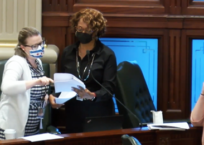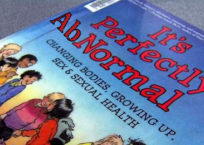
All Illinoisans should be troubled that our lawmakers vote for bills without demanding any evidence proving that the bills will solve the problems that the bills’ sponsors cite as the reasons the bills are needed.
Case in point: last week’s passage of the “comprehensive” sex ed bill (HB 2675) in the Illinois House of Representatives, which followed embarrassing performances by “progressive” lawmakers that wouldn’t pass muster in high school mock legislative assemblies.
State Representative Camille Lilly (D-Chicago) sponsored HB 2675, citing the problems of unwed pregnancies and sexually transmitted infections (STIs) among teens as the reasons comprehensive sex ed is necessary, but never provided conclusive evidence that comprehensive sex ed would solve those problems or that abstinence education—which is type of curricula that “progressives” detest—is the cause of the problems.
This bill compels every school district that teaches about sexuality to use “comprehensive” sex ed curricula even though every school district in Illinois already has that right. In fact, 60 percent of school districts in Illinois already use “comprehensive” sex ed.
Why would lawmakers mandate that all school districts use the type of curricula that most districts already use and is apparently failing? Why rob school districts of the right and freedom to choose abstinence-based curricula, which by the way, are medically accurate, unless there is rock solid proof that comprehensive sex ed is more effective at reducing the rates of teen pregnancy and STIs. Why rob school districts of the right and freedom to use the type of curricula that the U.S. House of Representatives Committee on Energy and Commerce just last summer recommended?
I listened to the entire floor debate on this legislation. Let’s look at what passes for logic and evidence in Springfield and what our lawmakers find intellectually persuasive:
State Representative Kathleen Willis (D-Northlake) — a supporter of the bill — suggested that this bill is necessary in order that “young children” will not “find out their sex education on the playgrounds or from their friends?” Rep. Willis offers the peculiar proposition that there are only two possibilities: comprehensive sex ed or playground sex ed. There is, however, another alternative: medically accurate abstinence education.
The strangest exchange during the debate took place between Rep. Lilly and Rep. David Reis (R-Olney). Perhaps someone can make sense of Lilly’s nearly incomprehensible responses:
Reis: “What exactly is ‘age-appropriate’ curriculum?”
Lilly: “Age-appropriate basically deals with providing information at the age at which the youth is prepared to receive.”
Reis: “And who determines that?”
Lilly: “The schools, they determine the curriculums.”
Reis: So, the State Board of Education won’t be mandating a certain curriculum at a certain time with your bill.”
Lilly: It’s a local school decision made by local officials of the school system.
Rice: “You say that it’s not a mandate to teach a particular curriculum, but it is a mandate…that they [schools] have to teach something. Is that correct?”
Lilly: “This bill is not a mandate.
Reis: “It’s not a mandate to teach a particular curriculum, but it is a mandate that they have to teach something. Is that not correct?”
Lilly: “No, it is not.”
Reis: “Are you sure?”
Lilly: “I am positive.”
Reis: “If that’s the case, why do you need your bill?”
Lilly: “Currently, the schools already have comprehensive sex education on the books. This bill brings clarification and definition to the existing code.”
Reis: “But if each school district has their own control over their own curriculum, and what they do, and whether or not they choose to do this, why do you need your bill? Your bill is a mandate that they [schools] have to teach something.”
Lilly: “This bill brings a standard of comprehensive sex education throughout the state—comprehensive, basic standard of sex education within the public school system.”
Reis: “So, now you’re saying there is a basic curriculum that needs to be adhered to, and then if the local school system wants to teach more of that they can?”
Lilly: “No, each school has the opportunity to decide whether they would want to offer sex education to their schools. That decision is made by the local school professionals and officers.
Supporters of the bill, either confused themselves or trying to confuse others, repeat ad nauseum that this bill allows schools to choose their own curriculum. What they don’t clearly explain is that schools may choose their own curriculum as long as it’s a “comprehensive sex ed” curriculum. School districts may choose not to offer sex ed, but if they offer it—as most do—this bill robs them of the right and freedom to choose an abstinence-based curriculum. (Don’t be deceived by the adjective “comprehensive.” Comprehensive sex ed simply means it includes whatever “progressives” view as important. Click here to get an overview of what “comprehensive sex educators” view as complete and age-appropriate.)
State Representative Robyn Gabel (D-Evanston) then asked if this bill “would provide instruction on both abstinence and contraception for the prevention of…sexually transmitted diseases.” Perhaps Gabel would be surprised to learn no form of contraception prevents sexually transmitted diseases, and some forms of contraception don’t even reduce the risk of acquiring a sexually transmitted disease.
Gabel also asked, “Isn’t it true that numerous studies show that comprehensive sexual health education that stress abstinence as well as provides information on prevention results in positive health outcomes for teens and young adults?” Neither Gabel nor Lilly, however, cited these “numerous studies.”
Rep. Gabel went on to share an irrelevant but illuminating tidbit of parenting advice from her own life. When her daughter was a “preteen,” Gabel bought her the feminist sexuality bible Our Bodies, Ourselves, infamous for the inclusion of age-inappropriate material wholly unrelated to reducing teen pregnancy and sexually transmitted infections. To read an excerpt from this book that Gabel thinks is age-appropriate for an 11 or 12 year-old, click HERE.
Rep. Gabel further shared this: “I would see my daughter’s friends just reading through this book, and her friends had no other place to go. They would call her on the phone. They would come over to the house to read the book.”
Does Gabel know for a fact that her daughters’ friends had no other place to go for essential sexual health information? Does she know for a fact that the parents of her daughters’ friends did not share essential sexual health information with their children? Could it be that the information in Our Bodies, Ourselves that her daughters’ friends found so compelling were ideas that were not essential to sexual health, or that it was information their parents would have found age-inappropriate? If her daughters’ friends were not getting the information presented in Our Bodies, Ourselves from their parents, was it Gabel’s right to present it to these young girls?
This anecdote epitomizes the arrogance of “progressives” who believe that children belong to the “collective” and who are so certain that their beliefs and values are the only correct ones that they are willing to usurp and circumvent the rights of other parents.
While sexuality amoralists like Lilly and Gabel wax concerned about the high rates of teen pregnancy and STIs, they intentionally omit discussions of the central reasons “progressives” push for comprehensive sex ed. They push for it because “progressives” have virtually no moral boundaries when it comes to sexuality, including the early sexualization of children and the affirmation of homosexuality and gender confusion as normative. While there is no conclusive research proving that comprehensive sex ed is consistently more effective than abstinence education at reducing rates of unintended pregnancies and sexually transmitted infections, it is indisputable that comprehensive sex ed is much more effective in advancing Leftwing beliefs about early and deviant sexual activity.
If you’re ambivalent about the value of this bill, perhaps this exhortation from State Representative Chris Welch (D-Westchester) will convince you: “This bill is keepin’ it real….These kids are having sex….It is important that we make sure that they do it properly and safely and that we can make sure the public health is maintained.” In the service of keepin’ it real, I’d like to suggest that “proper teen sex” is oxymoronic, perhaps even moronic.
State Representative Christian Mitchell (D-Chicago) prophesied with absolute certainty that the passage of this bill is the “fiscally responsible thing to do. We’re going to avoid spending money on the treatment of STDs. We’re going to avoid additional money on social services for unwanted children.” Apparently, Rep. Mitchell’s presumptuous proclamation is as good as actual evidence to those who voted for the bill.
State Representative Elaine Nekritz (D-Buffalo Grove) disingenuously expressed her deep concerns about the floor debates: “I find it troubling that we’re debating whether medically accurate, age-appropriate information is appropriate.” Any thinking and fair person knows that opponents of the bill have no problem with medically accurate information being presented to students. Opponents of this bill are concerned about the “age-appropriate” part. What the creators of typical comprehensive sex ed curricula view as “age-appropriate” is viewed by others as wildly inappropriate.
Rep. Nekritz then told a secondhand story about a teenage girl who found herself pregnant despite never having had intercourse. That is the “evidence” Nekritz believes is sufficient to justify a bill that prevents schools from using abstinence education. Did Nekritz bother to inquire about whether this young girl had received any kind of sex education and if so, what kind?
Rep. Lilly cited one CDC study but didn’t identify the study, so it’s difficult to fact-check. Lilly claimed that a CDC analysis found that “comprehensive sex ed is more effective than abstinence only.” According to the Washington Post, one 2009 CDC study found that “there is insufficient evidence to know whether programs that focus on encouraging teens to remain sexually abstinent until marriage are effective.” A 2012 CDC study of comprehensive sex ed and abstinence education concludes that “No conclusions could be drawn on the effectiveness of group-based abstinence education.” And a 2012 criticism of the 2012 CDC analysis is found here.
In addition there is research demonstrating the efficacy of abstinence ed (here and here.)
It’s astonishing that lawmakers, many of whom are attorneys who should understand the importance of evidence, feel no compunction about voting for a bill following such a stupid floor “debate.” Since research is inconclusive at best, it seems utterly unwarranted to prohibit school districts from using abstinence-based curricula if that’s what they want to use.
To summarize, this bill will rob school districts of the right to choose the type (i.e., comprehensive vs. abstinence) of curriculum that the U.S. House of Representatives Committee on Energy and Commerce recommendedjust last year. And it will rob school districts of the right and freedom to choose the type of curriculum that myriad studies have demonstrated is at least as effective if not more effective than “comprehensive” sex ed curricula are at reducing the rate of teen pregnancies and STIs. Unbelievable.
This bill is now in the Illinois Senate. Let’s hope the Senate floor debate proves more substantive than the fatuous House debate.
Take ACTION: Click HERE to send an email or a fax to your state senator today to ask him/her to vote NO to HB 2675.
Click HERE to make a donation to the Illinois Family Institute.

































